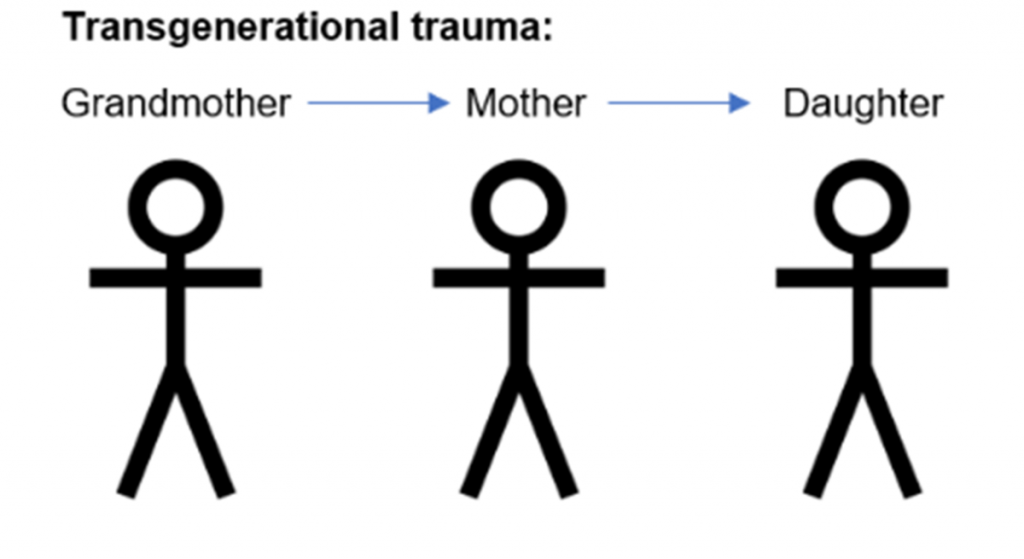by Caroline and Rosie Andrews

Last time I delivered a sermon, I spoke about my ideas about transgenerational trauma. To recap, this is the idea that the effects of a traumatic experience are passed down through generations. As I said, very little is known about the science behind forming memories; however, perhaps it is the response to trauma, rather than the memory of it, which makes its way through generations of families. This is recently starting to be a topic of scientific research which is gaining rapid traction. I have brought together the current knowledge of a subject known as epigenetics with some bible quotes which I believe to be hinting at its existence a few thousand years before our most brilliant geneticists started to cotton onto it.
To begin, I will reuse Acts 16:31, in which it is written: “The fathers have eaten sour grapes, and the children’s teeth are set on edge.” It was proven, just ten years ago, that fear can be passed down generations of mice. A father mouse was conditioned to an electric shock when he would smell a certain sweet food. Over time, changes occurred in the mouse such as an increased number of nerve cells in its nose to sense the smell as well as fearful behaviour when exposed to the smell. When it came to having offspring, these pups ended up with the same increased number of nerve cells as well as a fearful response to the smell of the food, despite never having been given an electric shock themselves. These pups had never even met their father. Exodus 20:12 quotes, “our fathers sinned, and are no more; and we bear their iniquities.”
DNA inside any living thing contains genes. Genes code for all our proteins, and therefore controls all our reactions involved in living processes such as thoughts, feelings, movement, and physical characteristics. No one’s DNA changes during their lifetime, aside potentially from a few mutations which usually make no difference. However, what we have recently found out is that which genes in our DNA are turned on and off CAN change. This is called epigenetics. In the case of the father mouse, genes were activated which caused an increase in nerve cells as well as a fear response to the smell. This change in which genes were active in the DNA was passed onto his pups.
2 Corinthians 5:21 states “Behold, I was brought forth in iniquity, and in sin did my mother conceive me.” Inheritable changes which occur due to someone’s experience will only be passed onto children if those epigenetic differences persist into conception via a sperm cell or an egg cell. The chances of this are predicted to be small. It should be noted that the Bible goes on to reject the notion of sons teeth being on edge following paternal consumption of sour grapes, as a righteous man will be saved. From all epigenetic studies undertaken so far, scientists have predicted that these changes in gene activation are likely to last no more than four generations. Immediately, I thought of the script “The Lord is slow to anger, abounding in love and forgiving sin and rebellion. Yet he does not leave the guilty unpunished; he punishes the children for the sin of the parents to the third or fourth generation.”
Of course, I am not likening all traumatic experiences to the act of sinning, but putting forwards the idea that repercussions of sins of our fathers might last for generations too.
A more positive spin on this new branch of science is that what we engage ourselves with in the world around us and beyond can bring about positive changes for generations to come.
Whatever innate challenges we face due to adversities us or our ancestors may have been exposed to in this life, we have the power to change both for ourselves and our children’s children. We can literally change the way we use our genetics! Acts 16:31 says “Believe in the Lord Jesus, and you will be saved, you and your household.” By the power of prayer and the Holy Spirit, we can find love and peace for our bodies to respond to; rather than stresses and threats. If God so chooses, these genes can persist through to old age, as they don’t always. If we choose to keep the Lord in our life, and as do our children, we will carry these changes with us in our Earthly bodies. Proverbs 22:6 says “Train up a child in the way he should go; even when he is old he will not depart from it.”
In conclusion, the world around us, our experiences and our beliefs literally change how we and our children use the genetics we were born with. This has the potential to pass on risks of mental and physical illnesses, but also good health and happiness. It is our choice whether or not we choose to hold onto our faith, that will save us and our future generations through an unbelievably expansive web of intricate processes that God could only have designed.
I will finish with Psalm 139:13-14: “For you created my inmost being; you knit me together in my mother’s womb. I praise you because I am fearfully and wonderfully made; your works are wonderful; I know that full well.”